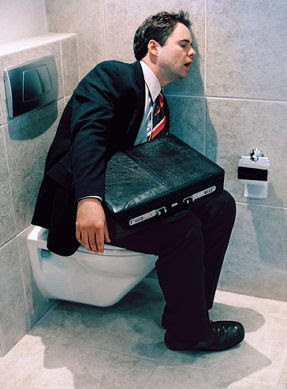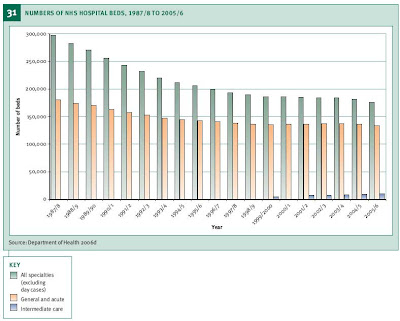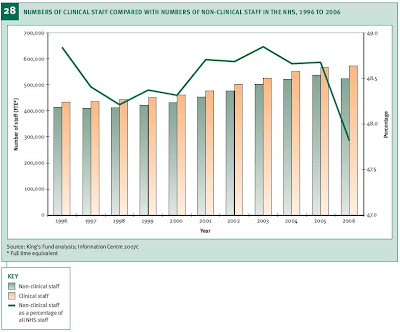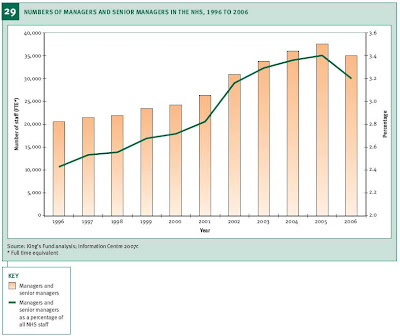
Is this what you want? Bosses need proper beds
I hate to break this to you, but the NHS has a serious problem: there aren't enough beds to go round.
As you know, the NHS aims to provide one bed for each of its administrators. That way, even when they all get fatigued at the same time, they can each have a separate bed to take a well earned nap. Any halfway decent employer would want that.
But according to the Department of Health, there are now 261,000 NHS administrative staff. Which is a problem because, as the new Wanless report tells us, there are only 176,000 beds. With 1.5 administrators per bed, that means they either have to sleep on the job, as it were (see pic), or adopt the unsavoury and highly unhygenic practice of hot-bedding.
The really scandalous thing is that NHS commissars should have known about this problem years ago.
When they nationalised our hospitals in 1948, there were about 450,000 beds. But it should have been obvious to everyone that an inefficient nationalised industry would never be able to maintain that many, which is why today there are only 176,000 left (a fall of 60%). Here's the Wanless chart for the last two decades:
As you know, the NHS aims to provide one bed for each of its administrators. That way, even when they all get fatigued at the same time, they can each have a separate bed to take a well earned nap. Any halfway decent employer would want that.
But according to the Department of Health, there are now 261,000 NHS administrative staff. Which is a problem because, as the new Wanless report tells us, there are only 176,000 beds. With 1.5 administrators per bed, that means they either have to sleep on the job, as it were (see pic), or adopt the unsavoury and highly unhygenic practice of hot-bedding.
The really scandalous thing is that NHS commissars should have known about this problem years ago.
When they nationalised our hospitals in 1948, there were about 450,000 beds. But it should have been obvious to everyone that an inefficient nationalised industry would never be able to maintain that many, which is why today there are only 176,000 left (a fall of 60%). Here's the Wanless chart for the last two decades:

What the commissars totally failed to grasp was that their ambitious long-term programme to make the NHS a world leading administrative affairs industry was in fatal conflict with this run-down in beds. How can you possibly be expected to administer properly if you can't lie down?
There's more bad news. According to Wanless, the number of non-clinical staff grew consistently faster than clinical staff from 1998 to 2003 and they almost became the majority. The ratio has now mysteriously slipped back:

What is going on? It's all very well for Wanless to say this reflects nothing more than a paper-shuffling outsourcing of non-clinical jobs, but it plays havoc with an essential management information metric. How are we to be sure that the administrative growth programme remains on course?
The only redeeming feature of this entire sorry saga is that the number of managers and senior managers in the NHS has shown commendably strong growth. Despite a slight dip last year, it's up by around 50% to 30,000 just in the last decade:

Jolly well done to all concerned!
Now, can we just do something on the beds? On my calculation, 85,000 administrators do not currently have their own bed. I therefore propose the immediate purchase of 85,000 Relyon Marquess single divans, priced at a very reasonable £1,010 each. For £85 mill we could have the problem sorted.
Why oh why can't the commissars come up with innovative ideas like that for themselves?
Footnote: Back in the real world, the NHS provides us with just about the lowest number of hospital beds per head of any country in Europe. According to OECD figures quoted by Wanless, we have 4.1 per 1,000 population, compared to 7.5 in France and 8.6 in Germany. Which means NHS patients have to wait longer, travel further, and get kicked out earlier (hence the increase in emergency readmissions). Overall, we were much better provided with beds before health was nationalised. Although it is true we were much less well provided with administrators.
Footnote: Back in the real world, the NHS provides us with just about the lowest number of hospital beds per head of any country in Europe. According to OECD figures quoted by Wanless, we have 4.1 per 1,000 population, compared to 7.5 in France and 8.6 in Germany. Which means NHS patients have to wait longer, travel further, and get kicked out earlier (hence the increase in emergency readmissions). Overall, we were much better provided with beds before health was nationalised. Although it is true we were much less well provided with administrators.